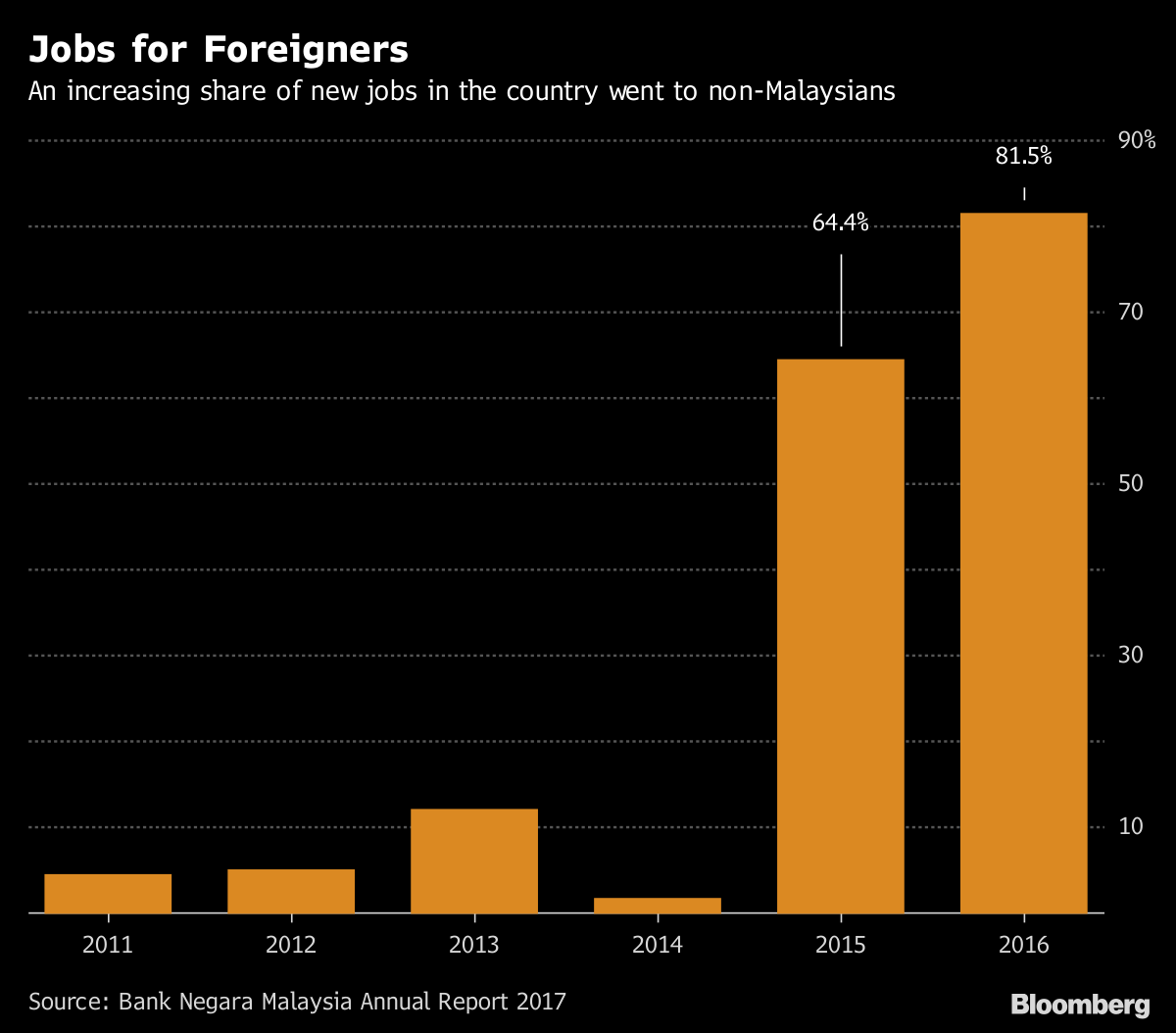Malaysia vote battle heats up with focus on jobs for young
Young Malaysians are being left behind in the nation’s economic recovery, a key challenge for an incoming leader needing to push the country out of its middle-income trap.
Amid a heated election battle, caretaker Prime Minister Datuk Seri Mohd Najib Razak can boast of having one of Asia’s lowest unemployment rates at 3.3% and an economy that’s growing above 5%. But that masks high joblessness among young people of more than three times the national rate, as well as depressed wages and low productivity.
As Najib defends his grip on power in Wednesday’s vote — which pits him against his former mentor and ex-Prime Minister Tun Dr Mahathir Mohamad — the focus on the campaign trail has shifted to top voter concerns: Creating jobs and boosting wages. Getting more young people working and reducing the economy’s reliance on cheap, foreign labour will be key to achieving that.
The jobless rate “hides a lot of unpleasant things in the labour market: Low pay, low productivity, low skill and a high number of foreign workers”, Dr Zakariah Abdul Rashid, ED of the Malaysian Institute of Economic Research, said at a conference in Kuala Lumpur in April. “Those unemployed are the youth, highly-qualified individuals who can’t get jobs.”
Malaysia’s economy is growing strongly, helped by an export recovery, rising oil prices and solid consumer demand. The central bank is predicting growth of 5.5% to 6% this year, while the currency has been one of Asia’s best performers in 2018, gaining almost 3% against the dollar.
Foreign labour has underpinned that rebound. The central bank estimates that about 82% of the net jobs created in 2016 went to non-residents. Unemployment among 15 to 24 year olds stood at 10.8% last year, according to the World Bank, while joblessness among local graduates has increased more sharply than non-graduates since 2011, data from the central bank shows.
An increasing share of new jobs in the country went to non-Malaysians.
“Job opportunities and wages will be the main challenge for Najib or Dr Mahathir because jobs have been concentrated in the bigger cities while opportunities are limited in the sub-urban and rural areas,” said Associate Prof Awang Azman Awang Pawi at the University of Malaya, who polled 1,550 voters across 12 parliamentary seats nationwide in a study last year on key election issues.
Malaysia isn’t alone in having high youth unemployment rates, Najib said in an April 24 interview. Even so, he said he’ll focus attention on the education system so that young people get the skills that the job market requires. His Barisan Nasional (BN) coalition has also committed to offering either jobs or training within six months of a student leaving school or university, he said.
“We will gear up or ratchet up our entire system to support that goal, the public sector and the private sector,” Najib said. “One of the things we’ll be looking at will be how do we then make a change in the education system in line with the current and future needs.”
To create higher-paying jobs, Malaysia first needs to change its cheap production model. A prolonged reliance on low-skilled imported labour has contributed to low wages and productivity, which is weighing on the economy, central bank governor Tan Sri Muhammad Ibrahim said in March. What started as a stop-gap measure to plug a labour shortage in the 1990s has become a permanent feature in the economy, he said.
Documented overseas workers accounted for 12% of the labour force last year, after a steady decline from 16.1% in 2013, according to central bank data. Still, adding in the unregistered workers may boost the total amount of foreign labour to as high as 40%, according to some estimates.
A BN government will aim to create more jobs for young people in rural areas, not just focusing on the hubs of Kuala Lumpur’s city centre and the administrative capital of Putrajaya, Khairy Jamaluddin, minister of youth and sports, said in an Instagram post.
Dr Mahathir’s Pakatan Harapan coalition has pledged to create one million jobs that will pay a monthly salary of at least RM2,500 in the first five years of its administration if elected to form a government, according to its manifesto.
“Jobs and wages are likely to be at the forefront of whoever wins power, with both BN and Pakatan Harapan’s manifestos focusing on improving both the quality of jobs and quality of human capital,” said Chia Shuhui, a senior analyst at BMI Research in Singapore. — Bloomberg


 English
English




